人教版(2019)选择性必修 第一册Unit 2 Looking into the Future Reading and Thinking课件(共30张PPT)
文档属性
| 名称 | 人教版(2019)选择性必修 第一册Unit 2 Looking into the Future Reading and Thinking课件(共30张PPT) | 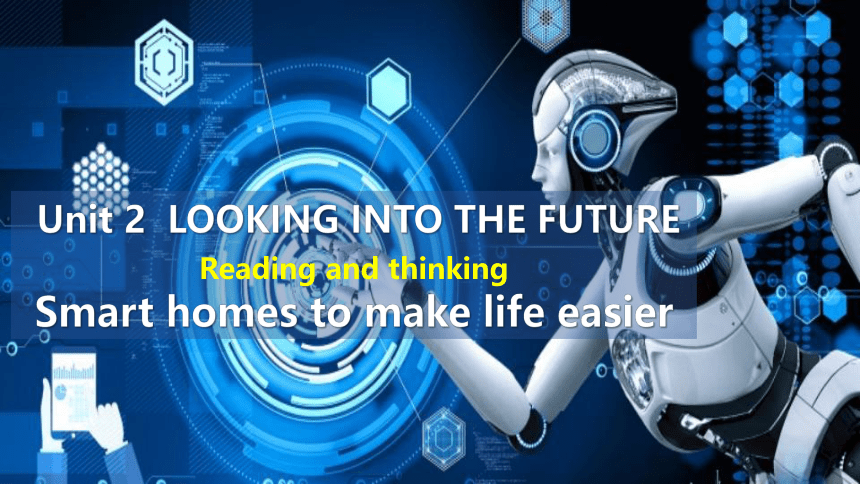 | |
| 格式 | pptx | ||
| 文件大小 | 5.4MB | ||
| 资源类型 | 教案 | ||
| 版本资源 | 人教版(2019) | ||
| 科目 | 英语 | ||
| 更新时间 | 2024-10-08 23:34:49 | ||
图片预览

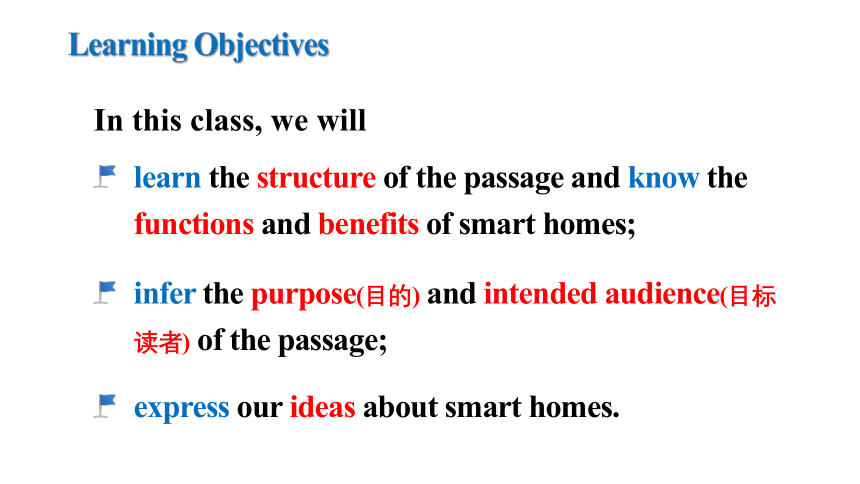
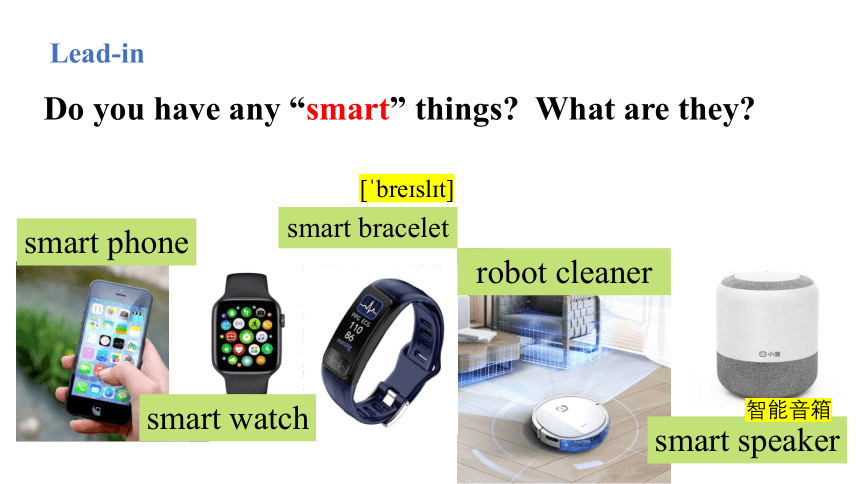
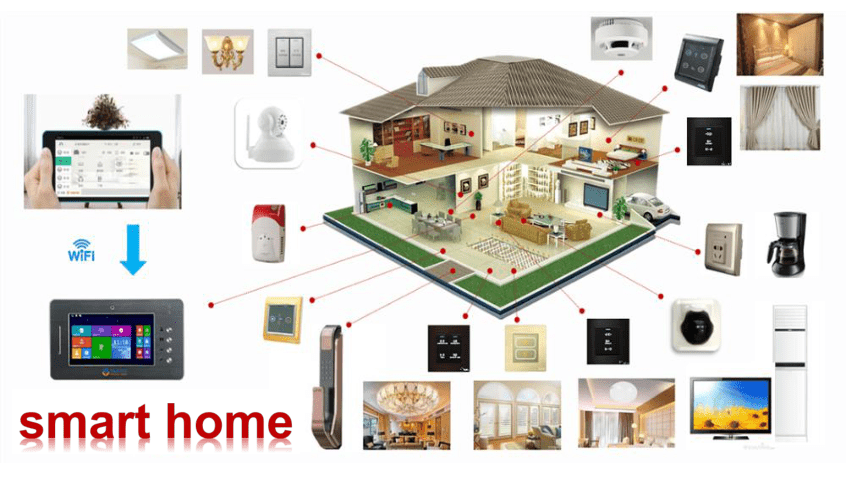
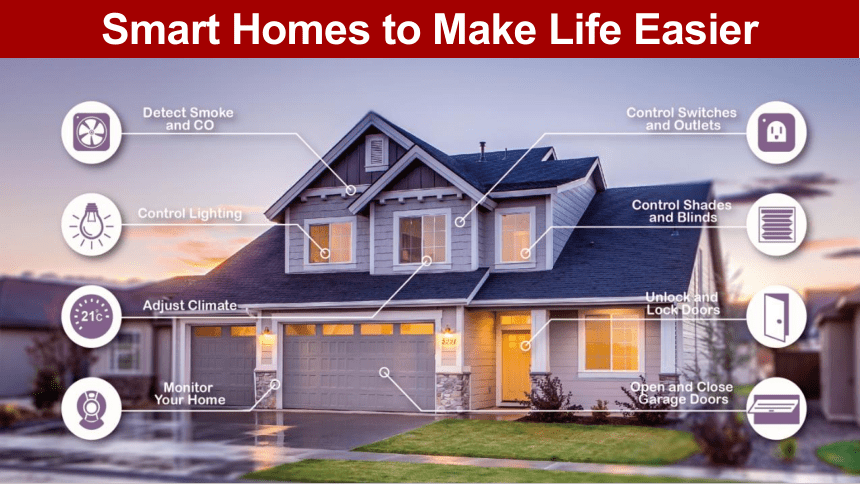
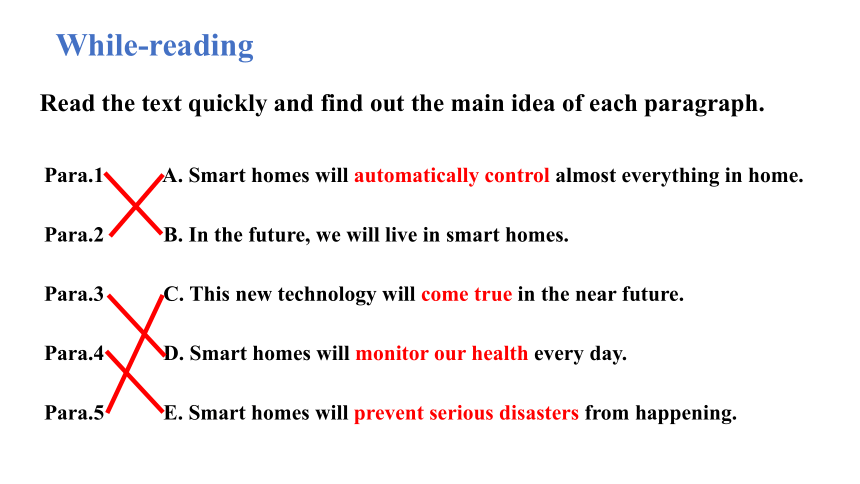
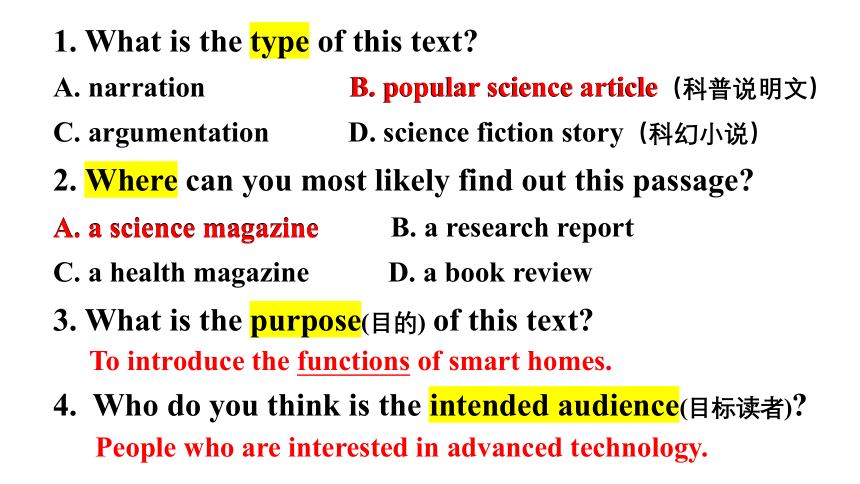
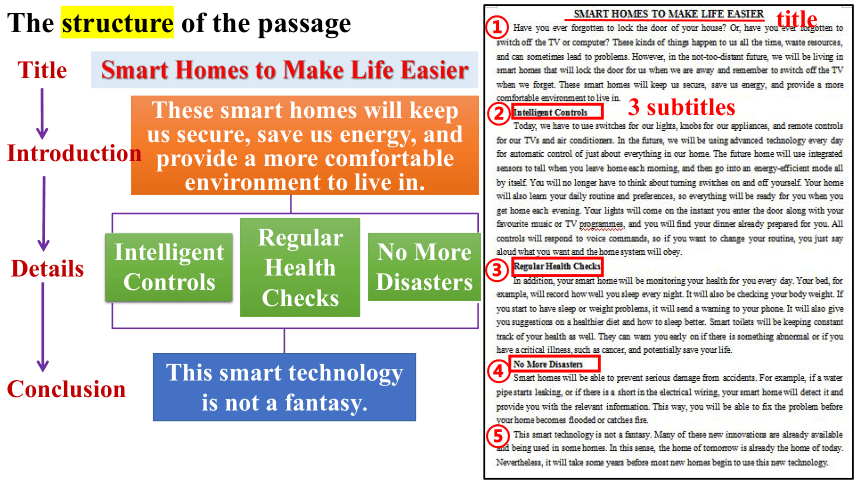


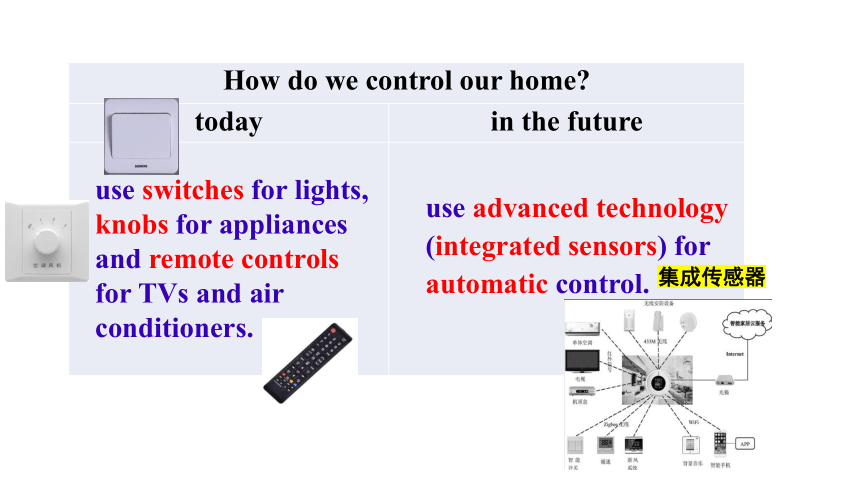

文档简介
(共30张PPT)
Unit 2 LOOKING INTO THE FUTURE
Reading and thinking
Smart homes to make life easier
In this class, we will
learn the structure of the passage and know the functions and benefits of smart homes;
infer the purpose(目的) and intended audience(目标读者) of the passage;
express our ideas about smart homes.
Learning Objectives
Do you have any “smart” things What are they
smart phone
smart watch
smart bracelet
smart speaker
robot cleaner
Lead-in
[ bre sl t]
智能音箱
smart home
Smart Homes to Make Life Easier
Para.1 A. Smart homes will automatically control almost everything in home.
Para.2 B. In the future, we will live in smart homes.
Para.3 C. This new technology will come true in the near future.
Para.4 D. Smart homes will monitor our health every day.
Para.5 E. Smart homes will prevent serious disasters from happening.
Read the text quickly and find out the main idea of each paragraph.
While-reading
1. What is the type of this text
A. narration B. popular science article(科普说明文)
C. argumentation D. science fiction story(科幻小说)
2. Where can you most likely find out this passage
A. a science magazine B. a research report
C. a health magazine D. a book review
3. What is the purpose(目的) of this text
4. Who do you think is the intended audience(目标读者)
B. popular science article
People who are interested in advanced technology.
To introduce the functions of smart homes.
A. a science magazine
①
②
③
④
⑤
title
3 subtitles
The structure of the passage
Smart Homes to Make Life Easier
Title
These smart homes will keep us secure, save us energy, and provide a more comfortable environment to live in.
Intelligent Controls
Regular Health Checks
No More Disasters
Introduction
This smart technology is not a fantasy.
Details
Conclusion
Read for details
Read Para.1 and answer the questions.
1)Why does the writer use two questions at the beginning of
paragragh 1
2)What can smart homes do in the future
To arouse the readers’ interest and introduce the topic.
keep us secure
save us energy
provide a more comfortable environment to live in
lock the door for us when we are away
switch off the TV when we forget
functions
benefits
Read for details
Read Para.2 and fill in the table.
How do we control our home Ordinary home (today) Smart home
(in the future)
How do we control our home today in the future
use switches for lights, knobs for appliances and remote controls for TVs and air conditioners.
use advanced technology (integrated sensors) for automatic control.
集成传感器
Group work Fill in the table below.
doors dinners
TVs, computers beds
water pipes, electric wires toilets
lights, favourite music, or TV programmes P15 Task3
In the future, what will smart homes do about…
doors dinners
TVs, computers beds
water pipes, electric wires toilets
lights, favourite music, or TV programmes lock the door for us when we are away
already prepared for you
switch off the TV when we forget
record how well you sleep;
check your body weight
come on the instant you enter the door
detect the problem and provide you with relevant information
keep constant track of your health
send a warning to your phone;
give you suggestions
warn you early on if there is something abnormal...
leak
short
Thinking How does the writer develop these paragraphs
use the second person to give people a real experience
give examples for further explanation
This smart technology is not a fantasy. Most of these new innovations are already available and being used in some homes. In this sense, the home of tomorrow is already the home of today...
positive / optimistic / supportive / hopeful
What’s the author’s attitude towards smart homes
Thinking
... However, in the not-too-distant future, we will be living in smart homes that will lock the door for us when we are away and remember to switch off the TV when we forget. These smart homes will keep us secure, save us energy, and provide a more comfortable environment to live in.
advantages
confident
energy-consuming
privacy issues
high cost
security problems
lose basic skills
Dicussion: Disadvantages of Smart Homes
difficult for elders to use
Solve the problems and improve the technology.
...
The best way to predict the future is to create it.
—Peter Drucker
预测未来的最好方式就是去创造它。
Unit 2 Looking into the future
Reading and Thinking
Language Points
智能家居让生活更轻松
SMART HOMES TO MAKE LIFE EASIER
Have you ever forgotten to lock the door of your house Or, have you ever forgotten to switch off the TV or computer These kinds of things happen to us all the time, waste resources, and can sometimes lead to problems. However, in the not-too-distant future, we will be living in smart homes that will lock the door for us when we are away and remember to switch off the TV when we forget. These smart homes will keep us secure, save us energy, and provide a more comfortable environment to live in.
Para. 1
forget to do sth. vs forget doing sth.
反:remember
lead-led-led
keep+宾语+宾语补足语,意为“使……继续处于某种状态”。有以下几种形式:
(1) keep+宾语+名词/形容词/副词/介词短语
(2) keep+宾语+现在分词
(3) keep+宾语+过去分词
在“keep+宾语+分词”结构中,如果宾语与宾语补足语之间为逻辑上的主谓关系,宾语补足语用现在分词;如果宾语与宾语补足语之间为逻辑上的动宾关系,宾语补足语用过去分词。高考中常考的可以接分词作宾语补足语的动词有find、leave、feel、see、hear、have、get 等。
导 P28 T3
单句填空
(1) A good listener takes part in the conversation, offering ideas and raising questions to keep the talk (flow).
(2) Please keep us (inform) of any change of address as soon as possible.
(3) He kept his eyes (close) and stayed where he was.
flowing
informed
closed
Intelligent Controls
Today, we have to use switches for our lights, knobs for our appliances, and remote controls for our TVs and air conditioners. In the future, we will be using advanced technology every day for automatic control of just about everything in our home. The future home will use integrated sensors to tell when you leave home each morning, and then go into an energy-efficient mode all by itself. You will no longer have to think about turning switches on and off yourself.
Para.2
almost
先进技术
adv. automatically
集成传感器
节能模式
Your home will also learn your daily routine and preferences, so everything will be ready for you when you get home each evening. Your lights will come on the instant you enter the door along with your favourite music or TV programmes, and you will find your dinner already prepared for you. All controls will respond to voice commands, so if you want to change your routine, you just say aloud what you want and the home system will obey.
Para. 2
一…就…
find+宾语+宾补
了解
语音指令
响应
follow 遵从
In addition, your smart home will be monitoring your health for you every day. Your bed, for example, will record how well you sleep every night. It will also be checking your body weight. If you start to have sleep or weight problems, it will send a warning to your phone. It will also give you suggestions on a healthier diet and how to sleep better. Smart toilets will be keeping constant track of your health as well. They can warn you early on if there is something abnormal or if you have a critical illness, such as cancer, and potentially save your life.
Para.3
Regular Health Checks
记录;跟踪 (不断的)
adv. 潜在地;可能地
定期健康检查
早期
严重的 =serious
warn
1. It warned people of the fire.
词性
v. 警告;告诫;提醒
例句
搭配
warn sb. of /about sth. 警告某人某物
warn sb. to do sth. 警告某人做某事
2. The teacher often warns us to study harder.
Task
8
(P15)It will also give you suggestions on a healthier diet and how to sleep better.
(1)翻译: _________________________________________________________________
此处 how to sleep better是“疑问词+(2)___________”结构,作介词on的宾语。
它也会给你提供如何健康饮食和如何睡得更好的建议。
不定式
“疑问词+不定式(短语)”结构相当于一个名词性从句, 通常在某些动词(如tell、 know、 imagine、 learn、 decide、 forget、 remember、 consider、 understand等)后面作宾语, 有时也用作主语、表语、同位语等。
A traffic light tells us when to cross the road.红绿灯告诉我们何时穿越马路。
When to start has not been decided.何时动身尚未决定。
The question is how to carry out the plan.问题是怎样执行这个计划。
They exchanged views on the question of whom to elect.
他们就该选谁的问题交换了意见。
【基础探究】
用“特殊疑问词+不定式”完成句子
(1)He didn't know__________________. 他不知道该怎样回答她。
(2)I don't know_____________advice from. 我不知道应向谁征求意见。
(3)Please explain to me where to begin and ______________.
请给我解释该从哪里开始及该怎么做。
【衔接写作】
how to answer her
who to ask
how to do it
Smart homes will be able to prevent serious damage from accidents. For example, if a water pipe starts leaking, or if there is a short in the electrical wiring, your smart home will detect it and provide you with the relevant information. This way, you will be able to fix the problem before your home becomes flooded or catches fire.
Para.4
No More Disasters
防止事故造成严重损害
=solve
adj. 水淹的
This smart technology is not a fantasy. Many of these new innovations are already available and being used in some homes. In this sense, the home of tomorrow is already the home of today. Nevertheless, it will take some years before most new homes begin to use this new technology.
Para.5
创新;创造
可以使用的 =accessible
从这种意义来讲
花费
Unit 2 LOOKING INTO THE FUTURE
Reading and thinking
Smart homes to make life easier
In this class, we will
learn the structure of the passage and know the functions and benefits of smart homes;
infer the purpose(目的) and intended audience(目标读者) of the passage;
express our ideas about smart homes.
Learning Objectives
Do you have any “smart” things What are they
smart phone
smart watch
smart bracelet
smart speaker
robot cleaner
Lead-in
[ bre sl t]
智能音箱
smart home
Smart Homes to Make Life Easier
Para.1 A. Smart homes will automatically control almost everything in home.
Para.2 B. In the future, we will live in smart homes.
Para.3 C. This new technology will come true in the near future.
Para.4 D. Smart homes will monitor our health every day.
Para.5 E. Smart homes will prevent serious disasters from happening.
Read the text quickly and find out the main idea of each paragraph.
While-reading
1. What is the type of this text
A. narration B. popular science article(科普说明文)
C. argumentation D. science fiction story(科幻小说)
2. Where can you most likely find out this passage
A. a science magazine B. a research report
C. a health magazine D. a book review
3. What is the purpose(目的) of this text
4. Who do you think is the intended audience(目标读者)
B. popular science article
People who are interested in advanced technology.
To introduce the functions of smart homes.
A. a science magazine
①
②
③
④
⑤
title
3 subtitles
The structure of the passage
Smart Homes to Make Life Easier
Title
These smart homes will keep us secure, save us energy, and provide a more comfortable environment to live in.
Intelligent Controls
Regular Health Checks
No More Disasters
Introduction
This smart technology is not a fantasy.
Details
Conclusion
Read for details
Read Para.1 and answer the questions.
1)Why does the writer use two questions at the beginning of
paragragh 1
2)What can smart homes do in the future
To arouse the readers’ interest and introduce the topic.
keep us secure
save us energy
provide a more comfortable environment to live in
lock the door for us when we are away
switch off the TV when we forget
functions
benefits
Read for details
Read Para.2 and fill in the table.
How do we control our home Ordinary home (today) Smart home
(in the future)
How do we control our home today in the future
use switches for lights, knobs for appliances and remote controls for TVs and air conditioners.
use advanced technology (integrated sensors) for automatic control.
集成传感器
Group work Fill in the table below.
doors dinners
TVs, computers beds
water pipes, electric wires toilets
lights, favourite music, or TV programmes P15 Task3
In the future, what will smart homes do about…
doors dinners
TVs, computers beds
water pipes, electric wires toilets
lights, favourite music, or TV programmes lock the door for us when we are away
already prepared for you
switch off the TV when we forget
record how well you sleep;
check your body weight
come on the instant you enter the door
detect the problem and provide you with relevant information
keep constant track of your health
send a warning to your phone;
give you suggestions
warn you early on if there is something abnormal...
leak
short
Thinking How does the writer develop these paragraphs
use the second person to give people a real experience
give examples for further explanation
This smart technology is not a fantasy. Most of these new innovations are already available and being used in some homes. In this sense, the home of tomorrow is already the home of today...
positive / optimistic / supportive / hopeful
What’s the author’s attitude towards smart homes
Thinking
... However, in the not-too-distant future, we will be living in smart homes that will lock the door for us when we are away and remember to switch off the TV when we forget. These smart homes will keep us secure, save us energy, and provide a more comfortable environment to live in.
advantages
confident
energy-consuming
privacy issues
high cost
security problems
lose basic skills
Dicussion: Disadvantages of Smart Homes
difficult for elders to use
Solve the problems and improve the technology.
...
The best way to predict the future is to create it.
—Peter Drucker
预测未来的最好方式就是去创造它。
Unit 2 Looking into the future
Reading and Thinking
Language Points
智能家居让生活更轻松
SMART HOMES TO MAKE LIFE EASIER
Have you ever forgotten to lock the door of your house Or, have you ever forgotten to switch off the TV or computer These kinds of things happen to us all the time, waste resources, and can sometimes lead to problems. However, in the not-too-distant future, we will be living in smart homes that will lock the door for us when we are away and remember to switch off the TV when we forget. These smart homes will keep us secure, save us energy, and provide a more comfortable environment to live in.
Para. 1
forget to do sth. vs forget doing sth.
反:remember
lead-led-led
keep+宾语+宾语补足语,意为“使……继续处于某种状态”。有以下几种形式:
(1) keep+宾语+名词/形容词/副词/介词短语
(2) keep+宾语+现在分词
(3) keep+宾语+过去分词
在“keep+宾语+分词”结构中,如果宾语与宾语补足语之间为逻辑上的主谓关系,宾语补足语用现在分词;如果宾语与宾语补足语之间为逻辑上的动宾关系,宾语补足语用过去分词。高考中常考的可以接分词作宾语补足语的动词有find、leave、feel、see、hear、have、get 等。
导 P28 T3
单句填空
(1) A good listener takes part in the conversation, offering ideas and raising questions to keep the talk (flow).
(2) Please keep us (inform) of any change of address as soon as possible.
(3) He kept his eyes (close) and stayed where he was.
flowing
informed
closed
Intelligent Controls
Today, we have to use switches for our lights, knobs for our appliances, and remote controls for our TVs and air conditioners. In the future, we will be using advanced technology every day for automatic control of just about everything in our home. The future home will use integrated sensors to tell when you leave home each morning, and then go into an energy-efficient mode all by itself. You will no longer have to think about turning switches on and off yourself.
Para.2
almost
先进技术
adv. automatically
集成传感器
节能模式
Your home will also learn your daily routine and preferences, so everything will be ready for you when you get home each evening. Your lights will come on the instant you enter the door along with your favourite music or TV programmes, and you will find your dinner already prepared for you. All controls will respond to voice commands, so if you want to change your routine, you just say aloud what you want and the home system will obey.
Para. 2
一…就…
find+宾语+宾补
了解
语音指令
响应
follow 遵从
In addition, your smart home will be monitoring your health for you every day. Your bed, for example, will record how well you sleep every night. It will also be checking your body weight. If you start to have sleep or weight problems, it will send a warning to your phone. It will also give you suggestions on a healthier diet and how to sleep better. Smart toilets will be keeping constant track of your health as well. They can warn you early on if there is something abnormal or if you have a critical illness, such as cancer, and potentially save your life.
Para.3
Regular Health Checks
记录;跟踪 (不断的)
adv. 潜在地;可能地
定期健康检查
早期
严重的 =serious
warn
1. It warned people of the fire.
词性
v. 警告;告诫;提醒
例句
搭配
warn sb. of /about sth. 警告某人某物
warn sb. to do sth. 警告某人做某事
2. The teacher often warns us to study harder.
Task
8
(P15)It will also give you suggestions on a healthier diet and how to sleep better.
(1)翻译: _________________________________________________________________
此处 how to sleep better是“疑问词+(2)___________”结构,作介词on的宾语。
它也会给你提供如何健康饮食和如何睡得更好的建议。
不定式
“疑问词+不定式(短语)”结构相当于一个名词性从句, 通常在某些动词(如tell、 know、 imagine、 learn、 decide、 forget、 remember、 consider、 understand等)后面作宾语, 有时也用作主语、表语、同位语等。
A traffic light tells us when to cross the road.红绿灯告诉我们何时穿越马路。
When to start has not been decided.何时动身尚未决定。
The question is how to carry out the plan.问题是怎样执行这个计划。
They exchanged views on the question of whom to elect.
他们就该选谁的问题交换了意见。
【基础探究】
用“特殊疑问词+不定式”完成句子
(1)He didn't know__________________. 他不知道该怎样回答她。
(2)I don't know_____________advice from. 我不知道应向谁征求意见。
(3)Please explain to me where to begin and ______________.
请给我解释该从哪里开始及该怎么做。
【衔接写作】
how to answer her
who to ask
how to do it
Smart homes will be able to prevent serious damage from accidents. For example, if a water pipe starts leaking, or if there is a short in the electrical wiring, your smart home will detect it and provide you with the relevant information. This way, you will be able to fix the problem before your home becomes flooded or catches fire.
Para.4
No More Disasters
防止事故造成严重损害
=solve
adj. 水淹的
This smart technology is not a fantasy. Many of these new innovations are already available and being used in some homes. In this sense, the home of tomorrow is already the home of today. Nevertheless, it will take some years before most new homes begin to use this new technology.
Para.5
创新;创造
可以使用的 =accessible
从这种意义来讲
花费
